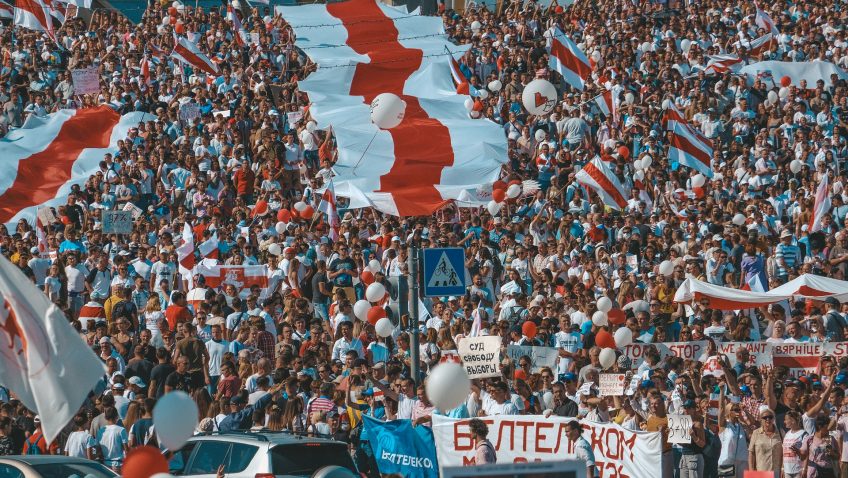No, Belarus will not cut out Europe’s access to gas this winter. In the midst of growing tensions between Belarus, Poland and the European Union (EU) regarding the migrant crisis at the Belarus-Poland border, Belarusian President Alexander Lukashenko threatened to cut Europe’s access to gas last week if the EU were to impose new sanctions against Belarus. This threat, while seemingly impressive given the key pipeline under threat, has not much chances of being realized, for several reasons.
Heated debates over the fence
Let us first return to the migration crisis that stirs Eastern Europe since a few weeks. On November 8, several migrants present at the Belarus-Poland border attempted to break through fences along the border and to penetrate the EU via Poland. This led Polish authorities to accuse Belarus of staging attacks against Poland, helped by Russian President Vladimir Putin to destabilize the EU as a whole. Following months of migrants attempting to cross the Polish, Latvian and Lithuanian borders from Belarus, the 8 November events added fuel to fire and prompted Poland and Lithuania to declare a state of emergency at their border with Belarus.
In an answer to the Polish accusations, Lukashenko denied playing a role in the crisis and in turn accused the EU of human rights violations caused by the Polish and Lithuanian refusals to let the migrants cross their borders.
This statement led European Commission President Ursula Von der Leyen to call on 9 November for an extended sanctions regime against Belarus for planning a hybrid attack against the EU under the guise of a migratory crisis. In the meantime, Russian spokeswoman Maria Zakharova argued the migratory crisis was not without precedents and demonstrated a whole failure of the EU in answering and living up to its commitment to act following the 2015 migrant crisis. On November 16, Russian Foreign Minister Serguei Lavrov added the EU applied a double standard in its management of migration crisis.
Bringing energy back in the picture
Following the threat of renewed European sanctions, Lukashenko announced on November 11 Belarus had the capacity to cut deliveries of gas to Europe via the 4,107 kilometres-long Yamal-Europe pipeline. This pipeline, built in 1994 and operated by Russian company Gazprom, links Russia to Poland via Belarus and delivers gas to European member-states such as Poland and Germany. On the paper, effectively cutting of gas supplies would raise concerns, as European gas market prices are close to achieving a record for high prices and surge in demand for fossil energy. This would bear stark consequences, not only for private households but also for firms and factories highly dependent on fossil fuels such as gas.
Cooling down the tensions?
However, it is extremely unlikely Lukashenko will carry out his threats, and this has something to do with Russia. Undoubtedly, Russia is no stranger to vigorous–if not assertive–energy politics and manipulations. One easily remembers the 2009 gas crisis occasioned by Russia cutting off Ukraine’s gas supplies, ad it would consequently seem logical to consider Russia would not condemn Belarus’ threat.
However, Russia has, against all odds, remained silent on the subject. Neither the Russian authorities nor Gazprom have commented on Lukashenko’s declarations. While this silence has led some commentators to suggest Russia would try to cool down the tensions, it remains that a critical issue has been left in the dark. As a matter of fact, this is not the first time Lukashenko has made such threats, without following them. This leads to wonder whether he would even have the power and legal authority to cut off supplies transiting through his country. One must indeed remember that the gas supplies are under Gazprom’s supervision, meaning under the supervisions of a public gas company mainly owned by the Russian government. Thus, the Belarusian authorities disrupting the work of a Russian-sponsored pipeline seems highly unlikely, despite the recent deployment of Russian nuclear-capable bombers over Belarus, in a show of support. Indeed, the gas belongs to Russia, and the Lukashenko government is financially supported by the Kremlin.
Besides, shutting the transit off would prove catastrophic for Belarus, as its national economy largely depends on gas transit and delivery to European member-states.
Therefore, Belarus will (certainly) not cut our Europe’s access to gas this winter. It could still decide to leverage gas supplies to Europe by following Russia’s directives. But it would be a question of international politics, and new sanctions would then fall on Belarus. And in the midst of this heated debate over gas and fuel, it seems to be forgotten that countless migrants are freezing to death at the border.


